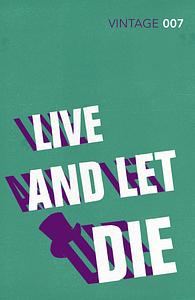You need to sign in or sign up before continuing.
Take a photo of a barcode or cover
adventurous
tense
The *third book in my attempt to read the James Bond series in the character's chronology is creator Ian Fleming's second, Live and Let Die, which was originally published in 1954 and trembles beneath the weight of the author's bigotry. Whether it was more acceptable in the era in which it was published is irrelevant; Fleming's portrayal of Black characters - and their mannerisms, their culture, the way they speak - is ignorant bullshit. It's seen throughout the book, but is most cringeworthy in chapter five, from its racist title on down.
Save for a reverent description of the Savoy Ballroom, the chapter is a grotesque display of racist caricature, with every bit of dialogue uttered by Black characters evoking incomprehensible stereotypes, while Bond and CIA counterpart Felix Leiter cooly observe like from an adjacent booth. Collectively, it was almost enough to make me give up reading the rest of the book.
Elsewhere, the Civil Rights movement, "habeas corpus and human rights and all the rest" are cast as threats to Fleming's perception of a decent society. It is grim reading in 2020, and really it should have been in 1954 too.
There are certainly thrills to be found in Live and Let Die, and the physical world painted by Fleming from trains to hotels to beaches is often captivating. But there's too much of the bad stuff to recommend the book, too much casual and/or aggressive racism. Reading Live and Let Die, it’s easy to understand why filmmakers avoided the book for the first decade of the series, finally tapping it in 1973 in a mostly clumsy attempt to get in on the Blaxploitation trend.
*I started with Anthony Horowitz's recent Forever and a Day, set in 1950 in which Bond earns his 00-status.
Save for a reverent description of the Savoy Ballroom, the chapter is a grotesque display of racist caricature, with every bit of dialogue uttered by Black characters evoking incomprehensible stereotypes, while Bond and CIA counterpart Felix Leiter cooly observe like from an adjacent booth. Collectively, it was almost enough to make me give up reading the rest of the book.
Elsewhere, the Civil Rights movement, "habeas corpus and human rights and all the rest" are cast as threats to Fleming's perception of a decent society. It is grim reading in 2020, and really it should have been in 1954 too.
There are certainly thrills to be found in Live and Let Die, and the physical world painted by Fleming from trains to hotels to beaches is often captivating. But there's too much of the bad stuff to recommend the book, too much casual and/or aggressive racism. Reading Live and Let Die, it’s easy to understand why filmmakers avoided the book for the first decade of the series, finally tapping it in 1973 in a mostly clumsy attempt to get in on the Blaxploitation trend.
*I started with Anthony Horowitz's recent Forever and a Day, set in 1950 in which Bond earns his 00-status.
Better and racier than Casino Royale but not quite worth 4 stars as I didn't like the voodoo scenes much.
I read this within a couple of days.
I read this within a couple of days.
It’s so so so racist 🙃
Graphic: Racism
One of my favorite Bond movies, but the book was a lot different. There wasn't a whole lot of action and unlike other Bond books, it didn't include a lot of culture either. Ian Fleming is pretty creative when it comes to the bad guys' plans and methods. I like how he figures out how to use simple, believably creative ways to execute their nefarious plans. Mr. Big's island is defended in a way I thought was a little unbelievable until I learned how he did it. Fun read.
Still good action writing, and now interesting as a period piece, too.
This is a smaller story than the grand sweeping Roger Moore movie. Bond visits New York, the gulf coast of Florida, and Jamaica here. No New Orleans, no crocodiles. And I shouldn't be using the word "believable," here, so I won't, but I'll say that Bond's exploits are "within the capabilities of a human."
Why is it interesting as a period piece? Because while Fleming both goes out of his way to have various characters say the black antagonist and all his black minions are intelligent, and that in any population of several million people, there are going to be some good, some bad, some smart, some dumb, etc., there's still plenty to make the modern reader uncomfortable. I'm not quite sure why. The 'N' word makes plenty of appearances, but is never uttered by Bond. There's lost of dialect in many of the black characters' speech, but I wouldn't say any of it is inaccurate. Mr. Big himself (the villain) speaks the queen's English. Still, there's discussion of, and a criminal mass organization based on, "negros'" (sic) natural belief in superstition.
On the other hand, there's plenty of charming Bond-ism. It never occurs to Bond that leaving his latest chick conquest alone is a dumb idea. The villain finds reasons he wants Bond kept alive. He monologues, too. Small precautions Bond takes pay off, while I'm almost yelling at the page, "but they're still just walking off the train without disguises, and taking a taxi!?" Oh, and Bond figures out what a police force going over a building "with a fine tooth comb" missed.
On the third hand, Fleming either did good research, or really knew the areas well. He describes Florida, especially Treasure Island, perfectly, and he knew Jamaica very well. The sailing jargon is perfect, and Bond's inner monologue constantly communicates a cold killing machine that takes in every situation as data that might come in handy.
This is a smaller story than the grand sweeping Roger Moore movie. Bond visits New York, the gulf coast of Florida, and Jamaica here. No New Orleans, no crocodiles. And I shouldn't be using the word "believable," here, so I won't, but I'll say that Bond's exploits are "within the capabilities of a human."
Why is it interesting as a period piece? Because while Fleming both goes out of his way to have various characters say the black antagonist and all his black minions are intelligent, and that in any population of several million people, there are going to be some good, some bad, some smart, some dumb, etc., there's still plenty to make the modern reader uncomfortable. I'm not quite sure why. The 'N' word makes plenty of appearances, but is never uttered by Bond. There's lost of dialect in many of the black characters' speech, but I wouldn't say any of it is inaccurate. Mr. Big himself (the villain) speaks the queen's English. Still, there's discussion of, and a criminal mass organization based on, "negros'" (sic) natural belief in superstition.
On the other hand, there's plenty of charming Bond-ism. It never occurs to Bond that leaving his latest chick conquest alone is a dumb idea. The villain finds reasons he wants Bond kept alive. He monologues, too. Small precautions Bond takes pay off, while I'm almost yelling at the page, "but they're still just walking off the train without disguises, and taking a taxi!?" Oh, and Bond figures out what a police force going over a building "with a fine tooth comb" missed.
On the third hand, Fleming either did good research, or really knew the areas well. He describes Florida, especially Treasure Island, perfectly, and he knew Jamaica very well. The sailing jargon is perfect, and Bond's inner monologue constantly communicates a cold killing machine that takes in every situation as data that might come in handy.
adventurous
fast-paced
Plot or Character Driven:
Plot
Strong character development:
No
Loveable characters:
No
Diverse cast of characters:
Yes
Flaws of characters a main focus:
No
Good story but marred these days by the language and attitude to African Americans, which was common at the time of writing.
Graphic: Gun violence, Racial slurs, Racism, Injury/Injury detail
Let's get this out of the way. Ian Fleming was a product of his time, upbringing and culture. Which means he was, by our standards, a horrendous racist and misogynist. For his time, perhaps, he was something of a liberal.
It's hard to judge a novel that's over 50 years old by today's standards. I'll give SOME of it a pass because of that. Indeed, given the time and place, the concept of the first really serious black criminal arising out of post-slavery America is quite an intriguing one, and innovative for the time.
In many ways, the movie follows the novel quite closely, except I really love the concept of smuggling pirate gold out into the world's markets to destabilize the price of regular gold to be a fantastic idea. Changing that to "drugs" in the movie was sort of pedestrian.
Another mistake the movie made was to split the villain into two characters. Mr. Big is an excellent villain and has some of the best dialog I've read in any of Fleming's books. So far, he's been the best realized villain.
The climax is also excellent, and I was turning pages as fast as I could read.
Better than the movie? It's hard to say. It's certainly different.
It's hard to judge a novel that's over 50 years old by today's standards. I'll give SOME of it a pass because of that. Indeed, given the time and place, the concept of the first really serious black criminal arising out of post-slavery America is quite an intriguing one, and innovative for the time.
In many ways, the movie follows the novel quite closely, except I really love the concept of smuggling pirate gold out into the world's markets to destabilize the price of regular gold to be a fantastic idea. Changing that to "drugs" in the movie was sort of pedestrian.
Another mistake the movie made was to split the villain into two characters. Mr. Big is an excellent villain and has some of the best dialog I've read in any of Fleming's books. So far, he's been the best realized villain.
The climax is also excellent, and I was turning pages as fast as I could read.
Better than the movie? It's hard to say. It's certainly different.
I enjoyed this book even more than Casino Royale. Well, that is if you ignore the racist slurs and negative view on the black population. But I think it is more-so a case of old-fashioned views, and the world changing. I would say that all the terms being used that are not politically correct, probably would appear in any movie that was made in the same year.
If you can get past the racism, this story is much more action packed than Casino Royale. The reader now has a sense of who James Bond is, and therefore we see him doing more in this book. There were more moments where I did not want to put down this book over Casino Royale.
Most people have said that Bond is "snobbish" is this novel, and I would disagree. His high standards in cars and food I find embellishes his personality, and anyone who does probably is American.
If you can get past the racism, this story is much more action packed than Casino Royale. The reader now has a sense of who James Bond is, and therefore we see him doing more in this book. There were more moments where I did not want to put down this book over Casino Royale.
Most people have said that Bond is "snobbish" is this novel, and I would disagree. His high standards in cars and food I find embellishes his personality, and anyone who does probably is American.
PRETTY ALRIGHT I GUESS.
James Bond did some shit, shot some bitches, kissed some gals, foiled some plans.
James Bond did some shit, shot some bitches, kissed some gals, foiled some plans.





